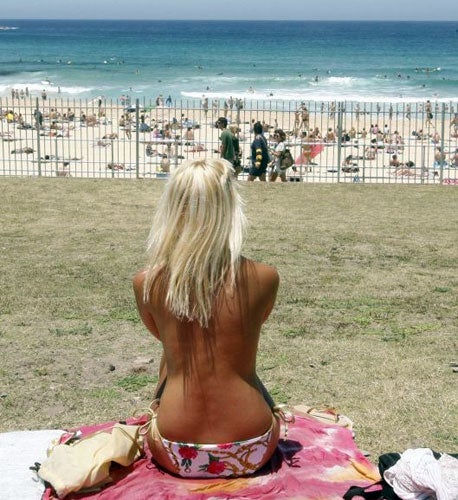Topless wars reignited on Australia's beaches
Christian MP wins mainstream support for his bid to tighten nudity laws

On any given day, acres of tanned flesh are on view at Bondi Beach: men wearing the briefest of briefs, women sunbathing topless. But it wasn't always so. In the 1940s, a legendary beach inspector, Aub Laidlaw, patrolled the golden sands, ruler in hand, ensuring that men's and women's bathing costumes conformed to bylaws governing public decency.
Costumes had to cover at least three inches of thigh, as well as the entire front of the body, and wobbly bits had to be kept in place by robust straps. Mr Laidlaw frogmarched 50 or more people a week off the beach, including, in 1945, the first woman to brave Bondi in a bikini, and in 1961, a group of men wearing Speedo swimming trunks.
The fanatical Mr Laidlaw retired in 1969, eight years after the bikini was legalised, but now his ghost is once again stalking Sydney's beaches. A Christian fundamentalist politician, the Rev Fred Nile, is calling for topless sunbathing to be outlawed, and he has received backing from several mainstream MPs.
While nudity is illegal in Australia except on designated beaches, local councils consider toplessness acceptable. Mr Nile wants the legislation to be tightened. "The law should be clear," he said. "It must say: 'Exposure of women's breasts on beaches will be prohibited'."
His proposal elicited howls of protest from sun-loving Sydneysiders, who have just begun their long summer holiday. Outraged callers deluged talkback radio stations, and the ACT nudist club in Canberra, the national capital, warned that Australia was in danger of appearing like a "haven for prudes".
However, Mr Nile, a veteran family values campaigner, was unrepentant, and several conservatives in the state parliament supported him, with Paul Gibson, a Labor MP, claiming that topless women made people uncomfortable. "If you're on the beach, do you want somebody with big knockers next to you when you're there with the kids?" he asked. A Liberal politician, David Clarke, agreed, telling Sydney's Daily Telegraph: "I don't think our young children should be confronted with nude bathers on these public beaches."
Mr Laidlaw, who made international headlines in 1951 after escorting a Hollywood starlet, Jean Parker, off Bondi for wearing a skimpy swimsuit, would applaud such sentiments. But many public figures poured scorn on Mr Nile, with Sally Betts, the mayor responsible for Bondi, declaring that toplessness did not equate to nudity. "Nude is when you've got no clothes on," she said.
Ms Betts added that Sydney faced far worse social problems than bare breasts. "We've got alcohol-related violence, we've got underage drinking and antisocial behaviour in the public domain: those are really important issues," she told local radio.
And – pertinently, in a country with the world's highest rate of skin cancer – a junior health minister, Jodi McKay, said that safety in the sun was more important than who exposed what.
Nude sunbathing is permitted on certain beaches in every state except Queensland. As for the Speedo trunks that so upset Mr Laidlaw: the men he arrested were charged with indecency, but the case was dismissed because no pubic hair had been exposed.
A new front: Defining decency
A decision by Facebook to censor pictures of breastfeeding mothers has caused a backlash. Barry Schnitt, a spokesman for the social networking website, said the images had been removed to protect children.
"Photos containing a fully exposed breast (as defined by showing the nipple or areola) do violate those terms (on obscene, pornographic or sexually explicit material) and may be removed," he said.
Kelli Roman, who fell foul of the breastfeeding ban, has collected 80,000 names for an online petition called "Hey Facebook, breastfeeding is not obscene!"
Join our commenting forum
Join thought-provoking conversations, follow other Independent readers and see their replies
Comments
Bookmark popover
Removed from bookmarks